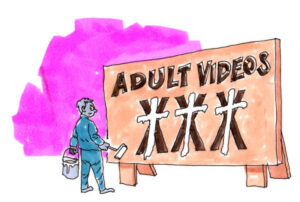How churches can help people struggling with pornography use

Christian teachings against pornography have not changed in the last century. But the pornography industry itself certainly has.
In the past, accessing sexually explicit material required significant effort. Today, anyone with a smartphone can find or even unintentionally stumble upon pornography in seconds.
One of the consequences of this shift is that the share of conservative Christians who view pornography has risen, although compared to the rest of the country it remains low. Recent surveys have shown that around half of evangelical men under age 30 use pornography at least weekly, according to Samuel Perry, author of “Addicted to Lust: Pornography in the Lives of Conservative Protestants.”
Data points like these may be cold comfort to Christians who struggle with pornography use. In many churches today, members who are upset or ashamed of their own pornography use often feel uncomfortable asking for help, Perry said.
In his book and other research, Perry, who is an associate professor of sociology at the University of Oklahoma, explores the upshot of this state of affairs. He writes about the deep shame felt by some Christians and how it can even lead to crises of faith.
“This is driving people away from their spiritual community and away from spiritual practices. It’s keeping people from having conversations with their spouses that could be healing for everybody,” he said.
Perry believes churches can address this shame without changing their teachings on pornography use. They can normalize forgiveness and repentance without normalizing pornography. The process involves communities of faith doing what they do best: forging deep connections with people in need and extending grace.
Samuel Perry in an interview with Deseret News said Research on pornography use has focused on whether or not it’s harmful to people. Psychologists, for example, have looked at what pornography does to the brain.
But what I wanted to understand was how religious context shapes someone’s experience of pornography. I wanted to see where conservative Christians who watch pornography fall on measures of personal well-being, relational well-being and marital satisfaction, Perry said.
He said I try to show in the book is that whatever pornography’s negative impact on somebody’s life, it seems to be way worse if you’re a committed Christian. If you’re a conservative Protestant, pornography use is more strongly associated with relational unhappiness and personal unhappiness than if you’re not.
“I interviewed a bunch of people for the book to try to get to the bottom of why pornography use affects conservative Christians in such a powerful way. I learned that it stems from the fact that people link pornography use to theological problems.
Many of the people I spoke with described pornography use as evil. They would use words like betrayal or adultery to explain what it represented and said that watching pornography was like having an actual affair.
“Among college-aged men, especially, many focused their spiritual self-assessment on their pornography use. If I asked them how they were doing spiritually, they would talk about how often they looked at pornography instead of how often they dug into the Bible, shared their faith or loved their neighbor. In other words, they believed that nobody who was doing well spiritually would ever look at pornography. If you do look, you’re disobedient. You’re not walking with God.”
Talking about moral incongruence, he said is a term I came up with to describe what it feels like to engage in an activity that violates your deeply held, sacralized values. It’s about doing something you feel social and personal shame for, something that creates anxiety and distress.
“For conservative Christians, pornography use creates a situation of moral incongruence. You hate what you’re doing, your community hates what you’re doing and yet you can’t stop doing it. My book looks at what moral incongruence does to a person and what it does to their community”, Perry said.
“I’ve been developing the concept with Josh Grubbs at Bowling Green State University. Our research has shown that people can also experience moral incongruence when they engaged in premarital sex or same-sex sexual activity. If you believe that these activities violate your moral values, you’ll feel worse about engaging in them than someone who doesn’t share those values.
“One of the things I try to show in the book is that the shame people feel from watching pornography often drives them away from their spiritual life. Young men and women who look at pornography don’t feel like going to church, reading the Bible or praying because doing those things would bring them more shame. They don’t feel the possibility of forgiveness.
“That’s why I would argue that their shame is not productive. It doesn’t lead them to repent and return to their community but, instead, makes them avoid church, praying or Bible reading. And it can make them hide from their spouse, which is a huge problem. You’re disrupting intimacy between partners if people can’t have conversations about this.”
“Church have to be able to talk about pornography use. By talking about it, people may be able to figure out why they watch pornography and what changes they need to make in their lives in order to stop.
It feels like the solution to this problem plaguing the church is for the church to be the church. Churches are supposed to be communities of people that recognize we all stumble and fall and we all sin and make mistakes. All of us have these hang-ups and negative patterns in our lives that we need to be able to talk about and work through”, Perry concludes.
Courtesy: Deseret



